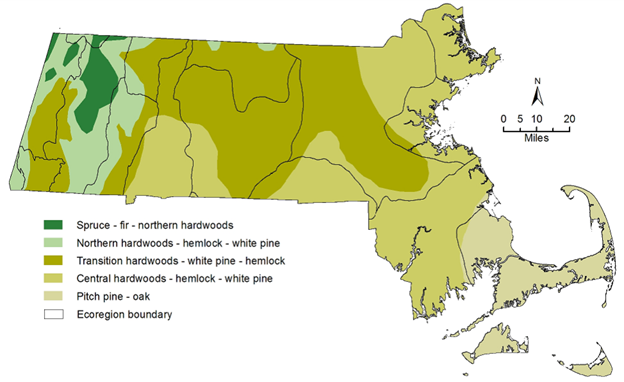How much forest land do we have and who owns it?
Forests cover nearly 3 million acres of land in Massachusetts. That’s 56% of all of Massachusetts! Of this:
- 64% is privately-owned by individuals, families, non-profit organizations, and businesses
- 36% is publicly-owned (Federal, State and Municipal)
- 17% is State-owned, including 9% by DCR State Forests and Parks, 3% by DCR Water Supply, and 5% by MassWildlife.
How much wood do we use?
We all use wood products nearly every day. Wood consumption in Massachusetts is estimated to be nearly 360 million cubic feet per year, to support the nearly 7 million residents. On average, each person uses over 50 cubic feet per year.
Massachusetts imports nearly all its wood. Using local wood products, such as wood building supplies for example, potentially lowers our carbon footprint by keeping carbon from Massachusetts in our Commonwealth. Similarly, harvesting locally can reduce transportation emissions of wood products, and gives consumers an opportunity to see and learn about the climate-friendly best management practices that are used in Massachusetts to harvest these products.
Figure: Massachusetts Forest Types
How much carbon do our forests store and sequester?
- Forest ecosystems in Massachusetts currently contain carbon stocks equivalent to approximately 1.2 gigatons of carbon dioxide, or the past 15 years of statewide GHG emissions. The state’s forests have among the highest carbon stocks per acre in New England.
- Net carbon sequestration from forest land uses is currently equivalent to just over 10% of statewide annual GHG emissions.
Carbon Storage on MassWildLife Lands
DCR Watershed Forestry, Climate Resiliency, and Carbon
DCR Managing Our Forests for Carbon Benefits
Forestry and the State’s Economy:
Massachusetts is one of the most-forested states in the country. Forestry and related industries support almost 38,000 jobs, $3.1 billion in labor income, $3.8 billion in value-add, and $9.2 billion in output. Business assistance to these sectors is critical to their long-term success, and in turn, sustaining the protection and health of these valued lands.
